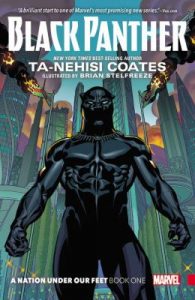This month, we offer book reviews by Shenisis Kirkland, a second-year student at Middlebury, a Brooklyn native and a student staff representative at the Anderson Freeman Center; Hector Vila, who has taught in the Writing Program at Middlebury College for more than 10 years and regularly publishes his writing on The Policy; and Jeff Rehbach, current conductor of the Middlebury College Community Chorus and former Middlebury College staff member in the Library and IT departments who retired in 2010.
On Ta-Nehisi Coates’ Black Panther,
a review by Shenisis Kirkland
During Career Day, I happened upon the comic Black Panther. As the only black superhero in the Marvel film and comic universe, I wanted to see if the hero held up to the standard of alternative headliners like Deadpool and the ever-returning, ever younger Spiderman. The republished comic by author Ta-Nehisi Coates offers both surface-level reading pleasure as well as insight into Coates’ proposed solutions to problems facing the our society today. Stepping aside from the veil of humor our two red-costumed friends often don, Black Panther manages to sustain an addicting intensity, bringing to life a passionate queer love-story, a government conspiracy, and a platonic and shared love for the common man.
Coates juggles a lot here, but it’s never overwhelming. If you have a love for drama, conspiracy, betrayal, and international politics, his refreshing take will engulf you whole-heartedly in the fictional nation of Wakanda. Nothing is expected, which I felt was nice break from the cumbersome repetitions of class and exam, class and exam, lunch date, and then another class and exam. Both women and men are given power and control, and often function within the intersections of sexual and racial minority. It’s funny, empowering, and inspiring. Black Panther allows you to laugh at its characters and at yourself because of how well you resonate with them. And, somehow your daily load seems slightly more manageable as it teaches you how to fail gracefully and succeed modestly.
The comic begins with a crumbling Wakanda. You don’t know who you’re meant to align yourself with. It was refreshing, considering that the climate on campus has us so tightly grasping to our own allegiances. My prediction, and my experience, is that you will struggle with who to love and who to hate in this comic. But in the end, you will find a place in your heart for everyone, stubborn rebel and naïve leader alike. Coates finds a way to conjure both an aversion to love of all kinds, and also to force its permanent embrace. From the perspective of an all-black civilization, the comic has the ability to live above the restrictions of race that many black-American works are forced to acknowledge. That said, the comic is also a critique on how, as people, we must do better-for everyone. It becomes clear that Coates believes a warm extension of kindness and understanding is all we need to cure our ills.
 On William C. Rhoden’s Forty Million Dollar Slaves,
On William C. Rhoden’s Forty Million Dollar Slaves,
a review by Hector Vila
This Winter Term, I will be teaching Forty Million Dollar Slaves: The Rise, Fall, and Redemption of the Black Athlete by former New York Times columnist and now contributing writer for ESPN’s The Undefeated, William C. Rhoden. I’ve taught Forty Million Dollar Slaves since its publication in 2006. The book describes how professional sports franchises are modeled after the plantation model and are responsible for removing powerful Black men from their communities. Moreover, the work asserts that when the Black athlete gains success, whether individually, as in the case of Muhammad Ali, or collectively, as with baseball’s Negro Leagues, rules are changed to keep the Black athlete in place – a hard lesson learned by Michael Jordan when he was initially denied co-ownership of the Washington Wizards basketball franchise. Author Rhoden also describes the conveyor belt, a system controlled by predominantly white colleges and universities, “which either banned or ignored black students, now … twisting themselves like pretzels to recruit them.” Thousands of Black athletes will ride this conveyor belt to the Promised Land, most of whom will fall by the wayside, forgotten. Forty Million Dollar Slaves is a call to action and awakening the Black athlete to his/her power– witness how the NFL is supporting Black athletes’ call to action. These are transitional times: those once voiceless and invisible are assuming positions of power and demanding change – and doing so in style, another theme Rhoden brings to the forefront. For more on this topic, see also my article in The Medium “The New York Times’ Whitewashing of the NBA’s Stephen Curry.”
 On Tracy Kidder’s A Truck Full of Money, a review by Jeff Rehbach
On Tracy Kidder’s A Truck Full of Money, a review by Jeff Rehbach
Published just over a year ago, A Truck Full of Money by Pulitzer Prize winning author Tracy Kidder details the life of Paul English, an entrepreneur who became an overnight millionaire to the tune of about $120,000,000 upon the sale of his web-based travel company, kayak.com. Kidder weaves together an absorbing look at Paul English’s life and his personal and professional relationships, from his early years at home and school — where he never quite fit in — to his business failures and successes. Throughout the book, Kidder intimately looks at how English struggled to deal with bipolar disorder and hypomania as a student, husband, parent, team leader, and software coder. Kidder weaves together numerous strands of contemporary society in his narrative, drawing on personal interviews and detailed research. For example, he describes several aspects of the growth of software coding and the internet, including a nearly reverential look at the work of Stanford University’s computer scientist Donald Knuth. He describes the poverty of the homeless in Boston and destitute residents of Haiti, where English supports health care initiatives with his newfound wealth. He examines teamwork, personal loyalty, and mentoring that contribute both to successful startups and to wildly imaginative workplace environments and ventures that collapse.
I found Kidder’s portrayal of the life of this entrepreneur and the world of information technology so different from what I expected and from what I encountered during my career here at Middlebury. I recommend this book for anyone curious for a glimpse at a brilliant student, anyone who has found traditional educational paradigms challenging to navigate, or anyone who has striven to find themselves and manage life in the fast-paced world of internet development during the past twenty-five years.
-Jeff Rehbach
Conductor, Middlebury College Community Chorus
Retired 2010 from Library and Information Services
Serving since 1981 in a number of roles including music librarian, systems librarian, user services coordinator for academic computing, director of information technology services, policy advisor and special projects manager for LIS

